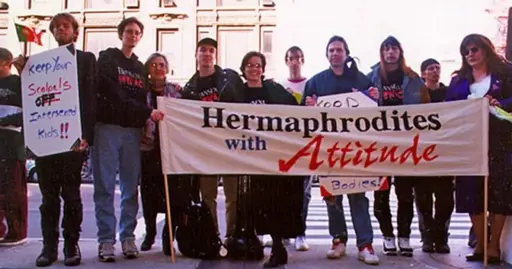In the 1990s, a small circle of intersex people came to know one another. They met face-to-face and connected over the internet (then a novelty). As they shared life experiences, medical records, and perspectives on the injuries and neglect they endured, a consensus quickly arose. They found shared struggles, caused not solely by widespread ignorance of ordinary human variance in reproductive development, but also by the ways they were known over.
At worst, this knowing over meant surgeries and other treatments carried out with little regard for their consent, then usually concealed from them. Medical jargon and vague euphemism had been layered along with scar tissue. The truth of their treatments was left impossible for intersex people to reach individually — but was easily recognised when they gathered. Then, they could intuitively grasp the shared wounding and neglect that previously isolated intersex people (that had caused them to know themselves only as medical freaks — best off corrected and hidden away — and not as their own category of human, who might understand themselves).
Intersex advocates first focused on dialogue, both internal and external, by raising consciousness at small community meetings and on purpose-made web forums and developing connections with allies in feminist scholarship and the LGBTQ+ movement. Intersex advocacy of this era had an unmistakable imprint of both the feminist and lesbian and gay movements. Intersex people drew slogans, strategies, insights, and approaches from earlier twentieth-century counterculture – and merging with the prevailing provocative style of ’90s queer campaigners.
After just three years of underground consciousness-raising organisation, intersex advocacy took to the streets (first in Boston in 1996, then quickly worldwide). Their first protest featured signs reading “SILENCE = DEATH”. Just two intersex demonstrators were flanked by transsexuals, holding a flamboyant picket to confront doctors with “feedback” from those who they’d harmed. From 1996 to today, advocates began confronting the professionals responsible for the harms done to intersex children, with the hope that future generations could be spared the developmental injuries that so many in the movement had endured.
Children were mutilated because some people couldn’t accept their existence.
We must force the cis people to stop doing sex surgeries to infants
for conservatives it’s only wrong if the child can consent
Cis people are weird, ngl. Especially cis men. The amount of entitlement I’ve observed that many cis men have, and the fact that the “nice guys” rarely speak up against those who believe themselves to be entitled, is insane. They want to make choices for others. They believe themselves to know everything. They think they’re the best. So they do absolutely horrible things to people like forcefully change people’s sex at birth. They are God’s gift to humanity, apparently.
Life doesn’t owe you anything; and yet, cis men are the most likely to act like life owes them everything.
Oh and by the way, dear reader, if you feel personally called out by this then maybe you need to look in the mirror and ask yourself why you feel that way. I know this is an issue from personal experience. I’m speaking as someone who has experienced the man’s world for about 30yrs and is transitioning to the woman’s world. The difference is bigger than I could have ever imagined.
Out of 100 births, approximately 2 are intersex. That’s more than I was raised to believe.
That’s orders of magnitude more than I would’ve guessed. I would’ve guessed like 1 in 10k or something.
Many are surgically changed near birth. Many are dressed and taught to act one way or the other. Its a taboo when it shouldn’t be.
Im not intersex, just learned a little about them.
… but also by the ways they were known over.
At worst, this knowing over meant …
Sorry to be off-topic, but what does “knowing over” mean? I’ve never heard this expression before, and searching doesn’t turn up any examples of it being used either. Is this some idiom of a regional dialect, or a typo that the author made twice in quick succession?
I’m not sure either, but both instances are italicised in the article itself. Perhaps it’s defined in the full book?
I feel like I’ve mostly got it from context. The ones “knowing them over” are the ones who are fully aware that they exist but working to perpetuate a world where the average person is oblivious. Rather than knowledge leading to the acceptance you typically expect, they know about but pave over.







